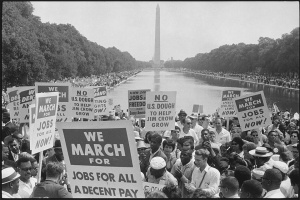 This Wednesday, August 28, marks a momentous anniversary, 50 years since hundreds of thousands of people poured into Washington, D.C. for the March on Washington, the “march of marches” in the civil rights movement. It was on this day, 50 years ago, that Dr. Martin Luther King, Jr. gave his immortal speech, and though his soaring finish has been quoted and replayed millions of times – if not quite as many as the “I have a dream” section – still his words bear remembering:
This Wednesday, August 28, marks a momentous anniversary, 50 years since hundreds of thousands of people poured into Washington, D.C. for the March on Washington, the “march of marches” in the civil rights movement. It was on this day, 50 years ago, that Dr. Martin Luther King, Jr. gave his immortal speech, and though his soaring finish has been quoted and replayed millions of times – if not quite as many as the “I have a dream” section – still his words bear remembering:
When we let freedom ring, when we let it ring from every village and every hamlet, from every state and every city, we will be able to speed up that day when all of God’s children, black men and white men, Jews and Gentiles, Protestants and Catholics, will be able to join hands and sing in the words of the old Negro spiritual, “Free at last! Free at last! Thank God Almighty, we are free at last!
(Full text available here.)
I imagine that, if he spoke today, Dr. King would expand the list of those “able to join hands” those he named explicitly in 1963. But the call for freedom, for freedom “at last,” remains as indispensable a call in 2013 as it was a half-century ago.
More than a “civil rights” march
This week’s anniversary could hardly be more timely. While the past June brought thrilling news for LGBT rights, the same court also gutted the Voting Rights Act just the day before Windsor and Perry came down. The Voting Rights decision flashed a thumbs-up sign at all the schemes, each more cynical than the last, to block millions of Americans, especially African Americans, other of-color and poor voters, from the voting booth.
Dr. King’s demand for justice also rings entirely too true when nearly every indicator of health, social, and economic well-being reveals shocking disparities between whites and African Americans. (See, for example, some federal data on health gaps.) It was no accident that the full name – often forgotten – of the 1963 March was the “March on Washington for Jobs and Freedom.” March organizers understood that equality before the law could only be a first step. Legal equality was essential, but not sufficient. Without economic and educational opportunities, without equal access to the means for a dignified and fulfilling life, “freedom” would not transform people’s lives – and would not, as its organizers aimed to, transform America itself.
Another hero that day
In this age of cell phones and the internet, it seems incredible that something like the March on Washington could be pulled off. But it was – and with stunning results. Much of the credit goes to the March’s chief organizer, Bayard Rustin, whose leadership in the civil rights movement stretched over decades.
 Rustin, as many know (but a surprising number do not) was gay. As did James Baldwin and other prominent LGBT African Americans, Rustin faced profoundly daunting challenges, dealing not only with the unforgiving intolerance of society at large, but also with enormous pressure from within the civil rights movement itself.
Rustin, as many know (but a surprising number do not) was gay. As did James Baldwin and other prominent LGBT African Americans, Rustin faced profoundly daunting challenges, dealing not only with the unforgiving intolerance of society at large, but also with enormous pressure from within the civil rights movement itself.
Yet he never lost sight of his goal. And for Rustin, that goal was not only about the struggle for African American civil rights (although that clearly led the list). Long before “inter-sectionality” became a popular term in academic and activist circles, Rustin lived the belief that movements for human freedom and dignity are linked, that one person’s fight is not his or hers alone. In fact, Rustin died on a humanitarian mission in Haiti. He helped to protect the property of Japanese Americans interred during World War II. He advocated for Jews in Soviet Russia, and he became outspoken about LGBT liberation in the 1970s. He worked with labor unions, churches, militants, pacifists, students, politicians, business people, and socialists.
Countless things will be written this week – and rightly so – about Dr. King’s great speech on August 28, 1963, as well as about the epic significance of the March itself. But this day, let’s also recall and honor another great American hero, a great gay African American hero, Bayard Rustin. And let’s celebrate the fact that the nation’s first African American president – something all but unthinkable in 1963 – will be awarding Rustin the Presidential Medal of Freedom, the highest civilian honor in America.
Someday, the dream of King, Rustin, and all those who that day descended on the nation’s capital will be realized. We’ve got a long way to go, as a community, a nation, and a world. But we must keep that dream in front of us until we – all of us – are there.
